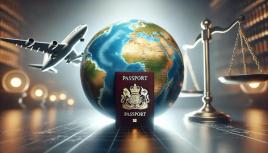Blog • Published on:March 26, 2025 | Updated on:March 27, 2025 • 18 Min
Key Factors to Consider Before Applying for Dual Citizenship
Dual citizenship has quickly moved from a niche privilege to a global trend, with more people exploring ways to secure a second passport than ever before.
In fact, as of early 2025, more than 90 countries officially recognize dual nationality, providing citizens with increased mobility, diverse job opportunities, and greater flexibility for retirement or investment overseas.
Discover the latest list of countries offering dual citizenship in 2025 and their requirements in our blog: Dual Citizenship Countries List & Requirements.
Yet, behind these appealing benefits lie several critical considerations, particularly when it comes to financial and tax obligations.
Understanding these factors clearly will ensure dual nationality remains a rewarding addition to your life, not a complex financial burden.
For example, U.S. citizens must report their global income to the IRS, no matter where they live, while some Caribbean nations, like Antigua & Barbuda, require new citizens to spend a minimum number of days in the country to maintain their passport.
In this article, we'll walk you through important details about dual citizenship, starting with key tax responsibilities every dual citizen should know.
Understanding the Realities of Dual Citizenship
When obtaining dual citizenship, you're gaining more than a second passport. You're stepping into an environment where you'll manage obligations to two different countries simultaneously.
Every nation has distinct requirements concerning taxes, reporting, and even financial compliance. Fully understanding these obligations is essential to make your dual citizenship a seamless and positive experience.
Considerations for Dual Citizenship: Factors and Solutions
Tax Responsibilities of Dual Citizens
Potential Double Taxation
One of the primary considerations with dual citizenship involves taxation. Some countries, particularly the United States, tax citizens on global income, regardless of residency.
Although international tax treaties can significantly reduce your risk of double taxation, they might not eliminate it completely.
Being proactive by clearly understanding each country's tax rules helps you avoid any unexpected financial obligations down the road.
Annual Tax Filing Requirements
Having citizenship in two countries means managing tax obligations in both jurisdictions. For example, U.S. dual citizens abroad must annually file tax returns and disclose assets or bank accounts held outside the U.S.
Timely filing and thorough record-keeping are vital to ensure you're compliant in each country. Clear organization prevents stress and avoids the risk of hefty fines for accidental non-compliance.
Global Banking and Compliance: Navigating FATCA
The Foreign Account Tax Compliance Act (FATCA), an essential U.S. legislation, significantly affects American dual citizens. FATCA requires foreign financial institutions to report accounts belonging to U.S. citizens to the IRS.
Because of these obligations, some international banks may limit or avoid dealing with American account holders altogether.
Knowing FATCA's implications allows you to strategically select financial institutions comfortable with dual-national customers, helping maintain smooth financial operations internationally.
Military Service Obligations for Dual Citizens
Navigating the intricacies of dual citizenship extends beyond tax considerations; understanding potential military service obligations is equally crucial. Here's what you need to know:
Mandatory Military Service in Certain Countries
Several nations enforce compulsory military service for their citizens. For instance:
- South Korea: Requires male citizens aged 18 to 28 to serve approximately 18 to 21 months in the military.
- Israel: Mandates military service for both men and women over the age of 18, with men serving 32 months and women 24 months.
- Austria: Implements mandatory military service for all able-bodied male citizens up to 35 years of age, with a service period of six months.
In some countries, these obligations apply regardless of where the citizen resides, meaning dual citizens could be required to serve even if they live abroad.
Conflicting Military Obligations Between Countries
Dual citizens may encounter conflicting military service requirements, especially if both countries enforce conscription. This situation can lead to:
- Legal Dilemmas: Simultaneous obligations to serve in two nations can create complex legal challenges.
- Diplomatic Tensions: Serving in one country's military might be viewed unfavorably by the other, potentially affecting diplomatic relations.
- Personal and Ethical Conflicts: Individuals may face moral dilemmas when obligations to both nations clash, especially if the countries have differing policies or are in conflict.
How to Navigate Dual Citizenship Military Requirements
To effectively manage potential military obligations as a dual citizen:
1. Research Each Country's Policies: Understand the specific military service requirements of both nations. Some countries may offer exemptions or alternative services for citizens residing abroad.
2. Consult Legal Experts: Seek advice from legal professionals experienced in international and military law to comprehend your obligations and rights fully.
3. Engage with Diplomatic Channels: Contact embassies or consulates of both countries for guidance on managing dual obligations. They can provide information on treaties or agreements that might affect your situation.
4. Stay Informed About International Treaties: Some treaties address military obligations for dual nationals, potentially offering solutions to conflicting duties.
5. Consider Renunciation if Necessary: In cases where conflicting obligations pose significant challenges, renouncing one citizenship might be a viable option. This decision should be made after thorough consideration and professional consultation.
Travel and Security Clearance Considerations for Dual Citizens
When you hold dual citizenship, traveling the globe might seem simpler at first glance, but complexities can arise, especially concerning border regulations and career prospects involving security clearances. To make your journey seamless, here’s exactly what you should consider.
Entry Requirements with Multiple Passports
Navigating international travel as a dual citizen requires a clear understanding of each country's specific entry and exit regulations.
For instance, Malta, a member of the European Union and the Schengen Area, recognizes dual citizenship and allows individuals to hold multiple nationalities.
When entering or exiting Malta, it's essential to use the passport that aligns with your travel itinerary and visa requirements. This ensures compliance with Maltese immigration laws and facilitates smoother border crossings.
In contrast, many Middle Eastern countries have specific regulations regarding dual citizenship and passport usage.
For example, some nations may not recognize dual nationality and could require individuals to enter and exit using only their Middle Eastern passport. This can lead to complications if the other nationality is not acknowledged or is restricted.
United Kingdom's ETA
For instance, starting from January 8, 2025, the UK requires visitors from various countries, including the USA, Australia, and Canada, to obtain an ETA before traveling. This requirement extends to eligible European visitors from April 2, 2025.
European Union's ETIAS
Similarly, the EU is implementing the ETIAS, expected to be operational by 2025. This system requires travelers from visa-exempt countries, including the UK, to obtain an online travel authorization before entering Schengen Area countries.
The ETIAS is valid for three years and permits multiple entries, with each stay limited to 90 days within any 180-day period.
Key Considerations for Dual Citizens
Holding dual citizenship can offer increased global mobility, but it also introduces complexities, particularly concerning travel regulations and employment opportunities requiring security clearances. Here's what dual citizens should consider:
- Research Entry/Exit Policies: Before traveling, thoroughly research the entry and exit requirements of both countries associated with your dual citizenship. This includes understanding visa requirements, permissible lengths of stay, and any mandatory registrations upon arrival.
- Application Consistency: When applying for an ETA or ETIAS, ensure you use the passport you intend to travel with, as the authorization is electronically linked to that specific document. Switching passports during travel can lead to complications at border controls.
- Consistent Passport Usage: To avoid potential issues, consistently use the same passport when entering and exiting a particular country. This practice helps maintain a clear travel record and reduces the likelihood of complications at border controls.
- Stay Informed About Policy Changes: Immigration and citizenship policies can change. Regularly consult official government sources or embassies for the most current information regarding travel requirements and dual citizenship recognition.
Conflicts in Security Clearance for Employment Opportunities
Holding dual nationality might limit employment opportunities, particularly in sensitive roles involving national security, intelligence agencies, or positions within aerospace, defense, or cybersecurity sectors.
Employers frequently see dual citizenship as a potential security risk because of divided national loyalties or complications arising from conflicting international obligations.
For instance, dual nationals are often subject to stricter background checks when applying for positions at U.S. government agencies, including roles requiring security clearances.
Clearance processes may be lengthier, and in some cases, individuals might be excluded entirely from certain sensitive positions, especially if their second nationality is from a country considered a geopolitical rival or competitor
Border Control Scrutiny and Additional Checks
Carrying two passports can occasionally attract extra attention at border controls. Customs officers might question dual nationals more thoroughly, especially if their nationalities are from countries with strained diplomatic relations or heightened security risks.
A practical example: Travelers with dual citizenship involving countries experiencing geopolitical tensions may undergo more extensive questioning or secondary screenings at international borders.
This additional scrutiny can add significant delays to your travels, making it crucial to carry supporting documentation clearly explaining your situation, like residence permits or official proof of dual nationality.
Tips for Smooth Travel and Career Navigation
To proactively manage these potential issues:
- Always travel with the appropriate passport. Check each country's regulations beforehand and use the correct passport when entering or exiting.
- Be transparent about your dual nationality when applying for jobs requiring security clearance. Honesty can simplify background checks and avoid future issues.
- Stay informed about international relations and adjust travel plans accordingly to minimize border scrutiny.
- Carry supporting documentation, such as proof of residency or employment, to reassure immigration officers at border controls.
Political and Diplomatic Protection Limitations
When holding dual citizenship, navigating political and diplomatic protections can become complex. Knowing precisely what support you can (and can't) count on is critical for your safety and peace of mind.
Consular Assistance Restrictions for Dual Citizens
Consular assistance becomes tricky when dual citizens experience legal or diplomatic issues in a country where they also hold citizenship.
Under international law, countries typically can't offer diplomatic protection to dual citizens against another country of their citizenship.
For example:
If a dual Maltese and Lebanese citizen is detained in Lebanon, Malta's embassy would generally be unable to offer full consular assistance, as Lebanon considers the individual exclusively Lebanese within its territory.
Similar scenarios frequently occur across Middle Eastern countries that don't fully recognize dual nationality, limiting available consular aid.
Diplomatic Protection Challenges in Countries of Citizenship
Diplomatic protection is generally unavailable to dual nationals while they are within the borders of a country where they hold citizenship. This is particularly important in nations with different legal frameworks or standards of due process.
Real-life scenario:
In cases involving dual citizens in Caribbean countries such as Dominica or Saint Lucia, diplomatic assistance from a second country might be limited if the citizen faces legal challenges locally.
European dual nationals, similarly, may find that EU consulates can't intervene if issues arise within an EU country where the individual also holds nationality.
Employment Restrictions and Professional Limitations
While dual citizenship significantly expands career possibilities, it can also restrict employment opportunities in specific sectors, particularly government roles, security-sensitive positions, and certain regulated professions.
Government Position Restrictions for Dual Citizens
Government jobs frequently come with strict nationality rules. Dual citizens can encounter limitations due to potential conflicts of interest or loyalty concerns.
Example:
- United Kingdom: Sensitive roles within the civil service, intelligence agencies (such as MI5 and MI6), or diplomatic service usually require British citizenship exclusively. Dual nationals might need to renounce other nationalities before being appointed to these positions.
- Middle Eastern countries: In nations like Saudi Arabia and the UAE, dual nationality can significantly restrict access to senior government positions, as these roles typically require exclusive allegiance.
Security-Sensitive Job Limitations
Careers in defense, cybersecurity, aerospace, or intelligence typically require security clearances, which dual citizenship can complicate. This situation arises from concerns over divided loyalties or potential foreign influence.
Example:
- United States: Dual nationals applying for U.S. federal jobs with security clearance may face rigorous background checks. Clearance approval might require renouncing foreign nationality if it is from a country with tense relations or security concerns.
- Europe: Roles within defense, aerospace, or cybersecurity sectors often demand exclusive citizenship due to sensitivity around access to classified information. Dual nationals may face barriers or additional scrutiny during clearance processes.
Professional Licensing Complications
Dual citizenship can introduce additional challenges for regulated professions, such as medical doctors, attorneys, and accountants. Licensing requirements, accreditation procedures, and residency criteria vary significantly between jurisdictions.
Examples:
- Malta and Middle Eastern professionals: A dual citizen licensed as a lawyer or medical professional in Malta may not automatically practice in Middle Eastern countries without further licensing processes.
- Caribbean citizenship-by-investment holders: Professionals who gain dual nationality in countries like Antigua and Barbuda or St. Kitts and Nevis still must verify whether their professional licenses from their original country are recognized, or if additional accreditation is necessary.
- European Union recognition: EU member states commonly recognize qualifications within Europe; however, if a dual national holds a non-EU nationality alongside an EU nationality, additional verification of professional credentials might be required.
Citizenship by Investment: Minimizing Dual Citizenship Considerations
Citizenship by Investment (CBI) programs provide attractive pathways for individuals seeking the security, global mobility, and economic opportunities associated with dual citizenship.
These programs enable applicants to become citizens by investing in real estate, government bonds, or national development projects.
Selecting the right program helps mitigate common dual-citizenship challenges, such as tax complications, military service obligations, or administrative burdens.
Here's an in-depth look at some specific Citizenship by Investment programs known for their advantages:
If you're considering obtaining a second passport for retirement, discover the best Caribbean islands to retire in our blog: Best Caribbean Islands to Retire.
Countries with Citizenship Programs that Minimize Considerations
1. Türkiye (Turkey)
Türkiye has become a popular destination for citizenship by investment due to its relatively straightforward requirements and considerable benefits:
- Investment Options: Applicants can choose between real estate investment (minimum USD 400,000), bank deposits, or establishing a business that creates employment.
- Military Exemption: Crucially, investors who obtain Turkish citizenship via CBI are exempt from the country's otherwise mandatory military service.
- Strategic Location: Citizenship provides extensive economic opportunities bridging Europe, Asia, and the Middle East.
- Tax Advantages: Türkiye doesn't impose wealth or inheritance taxes, and income earned abroad is typically exempt from local taxation, reducing global tax complexity for dual nationals.
2. Dominica
Dominica is recognized for offering one of the most established and respected CBI programs globally:
- Flexible Investment: Applicants may choose a non-refundable donation to Dominica's Economic Diversification Fund or invest in government-approved real estate projects.
- Travel and Mobility: A Dominican passport grants visa-free access to over 140 countries, including the UK, Schengen area, Hong Kong, and Singapore.
- Residency Freedom: There's no requirement to live or physically reside in Dominica, simplifying the administrative aspects of dual citizenship.
- Favorable Taxation: Dominica doesn't impose personal income, wealth, or inheritance taxes on foreign-sourced income, significantly minimizing tax complexities.
3. Malta
Malta offers one of the most robust European CBI programs, attracting affluent individuals seeking EU citizenship and its comprehensive benefits:
- EU Membership: Maltese citizenship grants the right to live, work, study, and retire anywhere within the European Union, significantly expanding personal and professional possibilities.
- Highly Transparent Program: The Maltese citizenship-by-naturalization program is recognized for rigorous due diligence, enhancing credibility and global acceptance.
- Financial Stability: Malta offers favorable taxation systems with numerous tax incentives, especially for non-domiciled residents, minimizing potential financial burdens associated with dual nationality.
- Cultural and Economic Advantages: Malta's stable political and economic environment provides additional security for investors.
4. Grenada
Grenada stands out due to unique advantages in the Caribbean region:
- E-2 Visa Eligibility (USA): Grenada uniquely holds a treaty with the United States allowing Grenadian citizens to apply for the E-2 Investor Visa, enabling business residency opportunities in the USA.
- Attractive Tax Environment: Grenada does not tax foreign-sourced income or impose wealth or inheritance taxes, providing a strategic tax environment for global investors.
- Investment Simplicity: Investors can acquire citizenship through a one-time donation to the National Transformation Fund or approved real estate investments.
- Travel Benefits: Grenada’s passport grants visa-free travel to over 140 countries, including China, Russia, the UK, and the Schengen Zone.
5. Antigua and Barbuda
Antigua and Barbuda's CBI program is highly regarded for its practical flexibility:
- Family Inclusiveness: This program readily accommodates families, allowing spouses, dependent children, and even dependent parents or grandparents to secure citizenship.
- Minimal Residency Requirement: Antigua requires a mere five days of residency within five years, significantly simplifying the administrative responsibilities associated with maintaining dual nationality.
- Tax Benefits: The absence of global income tax, inheritance, or capital gains taxes makes Antigua financially attractive to investors seeking dual citizenship with fewer fiscal obligations.
- International Access: Passport holders enjoy visa-free access to approximately 150 countries and territories, including the Schengen area and the UK.
6. Vanuatu
Vanuatu’s CBI program is well-known for its simplicity and rapid processing:
- Rapid Citizenship Process: Citizenship can typically be obtained within one to two months following the submission of applications, one of the fastest processes worldwide.
- Tax-Friendly Environment: Vanuatu imposes no personal income taxes, no capital gains, wealth, or inheritance taxes, presenting substantial financial incentives for global entrepreneurs and investors.
- Privacy and Confidentiality: Vanuatu maintains high privacy standards for investors, with minimal public disclosure of citizenship status.
- Visa-Free Mobility: Citizens gain visa-free travel access to over 125 countries, including the UK and Europe’s Schengen Area, facilitating significant international flexibility.
Making an Informed Decision About Dual Citizenship
Choosing dual citizenship through an investment program is an impactful decision with substantial benefits, but only when your selection aligns precisely with your personal, professional, and financial objectives.
When the Benefits Outweigh the Considerations
Dual citizenship significantly enhances global mobility, allowing visa-free travel to numerous countries and providing strategic options for your family’s future education, healthcare, and economic opportunities.
However, these advantages must surpass the practical considerations such as additional tax reporting, potential military obligations, and administrative complexities.
To determine whether dual citizenship through investment truly aligns with your life goals, consider these critical factors:
- Economic Advantages: Evaluate tax systems and economic opportunities provided by your prospective second country. Countries like Malta or Caribbean nations offer distinct tax advantages beneficial for high-net-worth individuals and international entrepreneurs.
- Lifestyle and Mobility: Consider visa-free travel opportunities and global accessibility offered by passports from countries such as Dominica, Grenada, and Antigua, enabling you to optimize global business or leisure travels.
- Family Considerations: Look for programs such as Antigua’s, which provide citizenship inclusively for families, granting comprehensive benefits extending to dependents.
- Ease of Compliance: Assess administrative and compliance obligations like residency requirements or tax filings. Countries with minimal residency obligations, like Dominica or Vanuatu, simplify your dual citizenship experience.
By thoroughly researching and understanding the implications of dual citizenship programs, you ensure the benefits significantly outweigh any complexities.
Engaging with qualified professionals in immigration, taxation, and financial planning further guarantees that your decision is informed, beneficial, and tailored specifically to your circumstances.
Dual Citizenship: Is It Worth the Investment?
Throughout this guide, we've explored essential considerations related to dual citizenship, including taxation responsibilities, military obligations, travel complexities, diplomatic protection limits, and employment considerations. Indeed, these factors demand thoughtful reflection and thorough preparation.
However, despite these considerations, securing a second passport through citizenship by investment can significantly expand your horizons, enrich your personal and professional opportunities, and enhance your overall quality of life.
The freedom to travel visa-free across continents, gain access to better healthcare and education, diversify your investments, or simply enjoy greater personal security and privacy are just some of the remarkable benefits dual nationality can deliver.
So, does dual citizenship through investment genuinely justify the effort and resources? For most investors looking for greater global freedom, flexibility, and opportunities, the answer is a resounding yes.
To navigate this journey effectively and avoid pitfalls along the way, choosing the right program is crucial. Matching your goals with the perfect citizenship-by-investment option, be it in Europe, the Caribbean, or beyond, ensures you maximize the benefits while minimizing complexity.
To confidently navigate your journey toward dual citizenship, contact Savory & Partners, and rest assured the process will be smooth, secure, and perfectly aligned with your goals.
FAQs on Essential Considerations for Dual Citizenship
1. What is dual citizenship, and how can it be obtained?
Dual citizenship, or dual nationality, refers to an individual holding legal citizenship in two countries simultaneously. This status allows a person to enjoy the rights and responsibilities of both nations.
Common pathways to acquiring dual citizenship include birthright (being born in a country that grants citizenship by birth), descent (having parents or grandparents from another country), naturalization (meeting residency and legal requirements of another country), marriage to a foreign national, or through investment programs offered by certain countries.
2. What are the tax implications of holding dual citizenship?
Dual citizens may be subject to the tax laws of both countries, potentially leading to double taxation on the same income. However, many countries have established double taxation agreements (DTAs) to mitigate this issue, allowing individuals to offset taxes paid in one country against the tax liability in another.
It's crucial for dual citizens to understand the specific tax obligations in both countries to ensure compliance and optimize tax efficiency.
3. Are there countries that do not permit dual citizenship?
Yes, while many countries allow dual citizenship, some nations do not recognize or permit it. For instance, countries like China and India do not allow their citizens to hold dual nationality.
It's essential to consult the specific laws of each country to understand their stance on dual citizenship.
4. How does dual citizenship affect military service obligations?
Dual citizens may be subject to compulsory military service in both countries where they hold citizenship. This can lead to conflicting obligations, especially if both nations enforce conscription.
It's essential to research and understand the military service requirements of both countries and seek legal advice if potential conflicts arise.
5. Can dual citizenship impact eligibility for certain jobs or security clearances?
Yes, holding dual citizenship can affect eligibility for specific employment opportunities, particularly in government positions or roles requiring security clearances.
Some countries may view dual nationality as a potential security risk, leading to disqualification from certain jobs. It's advisable to review the employment policies of both countries to understand any restrictions related to dual citizenship.
References
Statista Research Department. (2024, July 3). Migration in the UK: Statistics and facts. Statista. https://www.statista.com/topics/8188/migration-in-the-uk/
Wood, R. (2020, August 14). New record: Americans give up citizenship, avoiding IRS taxes forever. Forbes. https://www.forbes.com/sites/robertwood/2020/08/14/new-record-americans-give-up-citizenship-avoiding-irs-taxes-forever/
La Torre Jeker, V. (2024, December 3). Expatriation: New forms, more government scrutiny, bigger stakes. Forbes. https://www.forbes.com/sites/virginialatorrejeker/2024/12/03/expatriation-new-forms-more-government-scrutiny-bigger-stakes/
Pew Research Center. (2025, February 21). Trump’s executive order on birthright citizenship draws more disapproval than approval. Pew Research Center. https://www.pewresearch.org/topic/immigration-migration/immigration-issues/legal-immigration/citizenship/
Wood, R. (2012, June 26). IRS announces tax relief for dual citizens and U.S. citizens abroad. Forbes. https://www.forbes.com/sites/robertwood/2012/06/26/irs-announces-tax-relief-for-dual-citizens-and-us-citizens-abroad/
Written By

João Silva
João Silva is a seasoned consultant in the global mobility industry with over 12 years of experience. Specializing in European residency and citizenship by investment programs, João has assisted hundreds of high-net-worth clients in securing their second citizenship through strategic investments in real estate and government bonds.
Related Articles









Recently Published









Book a free consultation


